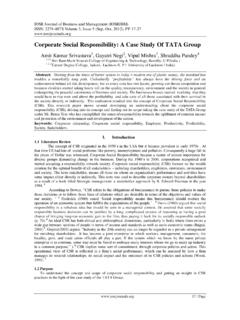Transcription of Issues and Challenges Faced By Corporate Social ...
1 IOSR Journal of Business and Management (IOSR-JBM) e-ISSN : 2278-487X, p-ISSN : 2319-7668, PP 58-61 National Conference on Innovative Business Practices in Technological Era 58 | Page Erode Sengunthar Engineering College, Thudupathi, Erode Issues and Challenges Faced By Corporate Social Responsibility In Community Development, India Human Resource Development 1P. Sivaranjini, 2T. Rekha 3 Nisha 12 Ponjesly College of Engineering NAGERCOIL, KANYAKUMARI -DIST. ABSTRACT: Over the last few years an increasing number of companies worldwide started promoting their business through Corporate Social responsibility strategies because the customers, the public and the investors expect them to act sustainable as responsible. In some cases, Corporate Social responsibility is refers to companies which are interacts with Social and environmental concerns into their business operations and interactions with their own employees, customers, shareholders, investors, local communities, government on a voluntary basis.
2 The aim of this paper is to find out- Issues and Challenges Faced by Corporate Social responsibility strategies in community development in India. The study includes the evolution over time changes in Indian cultural norms of Corporate Social responsibility. The study which reviews the four phases which runs with different approaches towards Corporate Social responsibility. The objective of the present study is to identify the Issues and Challenges Faced in community development by Corporate Social responsibility in India. Data has to be collected from multiple source of evidence in addition to books, web sites and journals. This paper includes some of the positive outcomes that can arises when business adopt a policy of Social responsibility. This paper studies the concepts of companies benefit from the Corporate Social responsibility strategies. It reviews some of the special drives pushing business towards Corporate Social responsibility strategies, a key challenge facing business is the need for more reliable indicators of progress in the field of Corporate Social responsibility, along with the dimensions of Corporate Social responsibility strategies.
3 The study implies the key Issues identified by kingfisher strategies in their companies strategies. Internationally the government moving towards the certain elements of Corporate Social responsibility with regards in protection of environment. I. INTRODUCTION Corporate Social Responsibility is a concept whereby companies integrate Social and environmental concerns into their business operations and in their interaction with their stakeholders (employees, customers, shareholders, investors, local communities, government), on a voluntary basis. Corporate responsibility programs can help businesses entice customers, attract and retain talent, assure investors, reduce operating costs, improve employee morale and enhance a company's reputation. However, business owners should understand the benefits and limitations of Corporate responsibility programs in order to choose an initiative that benefits the community and the company.
4 Corporate responsibility programs must be embraced and supported by top management and woven into company culture and operations. Stakeholders will soon become skeptical of one-time initiatives or programs that come and go. Convincing shareholders or other financial decision makers to allocate resources to a program designed to benefit something other than the company's bottom line can be the first obstacle a small business owner must overcome. Small businesses owners should not assume that customers and community members know about the company's investment in socially responsible programs. Among other countries India has one of the richest traditions of Corporate Social Responsibility. Much has been done in recent years to make Indian Entrepreneurs aware of Social responsibility as an important segment of their business activity but Corporate Social Responsibility in India has yet to receive widespread recognition.
5 If this goal has to be realized then the Corporate Social Responsibility approach of Corporate has to be in line with their attitudes towards mainstream business- companies setting clear objectives, undertaking potential investments, measuring and reporting performance publicly. The Four Phases of CSR Development in India The history of Corporate Social Responsibility in India has its four phases which run parallel to India's historical development and has resulted in different approaches towards Corporate Social Responsibility. However the phases are not static and the features of each phase may overlap other phases. The First Phase Issues and Challenges Faced By Corporate Social Responsibility In Community Development,.. National Conference on Innovative Business Practices in Technological Era 59 | Page Erode Sengunthar Engineering College, Thudupathi, Erode In the first phase charity and philanthropy were the main drivers of Corporate Social Responsibility.
6 Culture, religion, family values and tradition and industrialization had an influential effect on Corporate Social Responsibility. In the pre-industrialization period, which lasted till 1850, wealthy merchants shared a part of their wealth with the wider society by way of setting up temples for a religious cause. With the arrival of colonial rule in India from 1850s onwards, the approach towards Corporate Social Responsibility changed. The industrial families of the 19th century such as Tata, Godrej, Bajaj, Birla, Singhania were strongly inclined towards economic as well as Social considerations. However it has been observed that their efforts towards Social as well as industrial development were not only driven by selfless and religious motives but also influenced by caste groups and political objectives. The Second Phase In the second phase, during the Independence movement, there was increased stress on Indian Industrialists to demonstrate their dedication towards the progress of the society.
7 According to Gandhi, Indian companies were supposed to be the "temples of modern India". Under his influence businesses established trusts for schools and colleges and also helped in setting up training and scientific institutions. The operations of the trusts were largely in line with Gandhi's reforms which sought to abolish untouchability, encourage empowerment of women and rural development. The Third Phase The third phase of Corporate Social Responsibility (1960 80) had its relation to the element of "mixed economy", emergence of Public Sector Undertaking and laws relating labor and environmental standards. During this period the private sector was forced to take a backseat. The public sector was seen as the prime mover of development. Because of the stringent legal rules and regulations surrounding the activities of the private sector, the period was described as an "era of command and control".
8 The Fourth Phase In the fourth phase (1980 until the present) Indian companies started abandoning their traditional engagement with CSR and integrated it into a sustainable business strategy. In 1990s the first initiation towards Globalizations and Economic Liberalization were undertaken. Controls and licensing system were partly done away with which gave a boost to the economy the signs of which are very evident today. Increased growth momentum of the economy helped Indian companies grow rapidly and this made them more willing. Globalization has transformed India into an important destination in terms of production and manufacturing bases of TNCs are concerned. As Western markets are becoming more and more concerned about and labour and environmental standards in the developing countries, Indian companies who export and produce goods for the developed world need to pay a close attention to compliance with the international standards.
9 Some of the positive outcomes that can arise when businesses adopt a policy of Social responsibility include: 1. Company benefits: Improved financial performance; Lower operating costs; Enhanced brand image and reputation; Increased sales and customer loyalty; Greater productivity and quality; More ability to attract and retain employees; Reduced regulatory oversight; Access to capital; Workforce diversity; Product safety and decreased liability. II. BENEFITS TO THE COMMUNITY AND THE GENERAL PUBLIC Charitable contributions; Employee volunteer programmes; Corporate involvement in community education, employment and homelessness programmes; Product safety and quality. III. ENVIRONMENTAL BENEFITS Greater material recyclability; Better product durability and functionality; Greater use of renewable resources; Issues and Challenges Faced By Corporate Social Responsibility In Community Development,.. National Conference on Innovative Business Practices in Technological Era 60 | Page Erode Sengunthar Engineering College, Thudupathi, Erode Integration of environmental management tools into business plans, including life-cycle assessment and costing, environmental management standards, and eco-labelling.
10 How companies benefit from the Corporate Social Responsibility concept No matter the size of an organization or the level of its involvement with Corporate Social Responsibility every contribution is important and provides a number of benefits to both the community and business. Contributing to and supporting Corporate Social Responsibility does not have to be costly or time consuming and more and more businesses active in their local communities are seeing significant benefits from their involvement: Reduced costs Increased business leads Increased reputation Increased staff morale and skills development Improved relationships with the local community, partners and clients Innovation in processes, products and services Managing the risks a company faces IV. CURRENT STATE OF CSR IN INDIA Companies have specialized Corporate Social Responsibility teams that formulate policies, strategies and goals for their Corporate Social Responsibility programs and set aside budgets to fund them.















